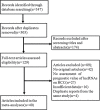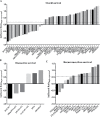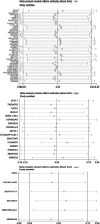lncRNAs as prognostic molecular biomarkers in hepatocellular carcinoma: a systematic review and meta-analysis
- PMID: 28938667
- PMCID: PMC5601763
- DOI: 10.18632/oncotarget.19559
lncRNAs as prognostic molecular biomarkers in hepatocellular carcinoma: a systematic review and meta-analysis
Abstract
The latest studies have shown that long non-coding RNAs (lncRNAs) may be considered markers as their expression levels were abnormal in cancer and can be used as a molecular biomarker for the potential assessment of cancer prognosis. In this study, we aimed to assess the prognostic value of lncRNA as marker of patients with hepatocellular carcinoma. We performed a detailed search of the PubMed and Embase databases for articles on the prognostic value of various lncRNAs in HCC. We then carefully extracted the relevant data from the articles, and we used the meta-analysis method to analyze these results; heterogeneity and publication bias were also evaluated. With 40 associative studies included, we found that high expression of 27 types of lncRNA was associated with a poor prognosis in HCC patients, and low expression of 18 types of lncRNAs was associated with a worse prognosis. Patients with higher lncRNA expression had significantly poor overall survival (OS; pooled HR, 1.25; 95% confidence interval [CI], 1.03-1.52) as well as significantly poor recurrence-free survival (RFS; pooled HR, 1.66; 95% CI, 1.26-2.17). Overexpression of lncRNAs may not meaningfully predict disease-free survival (DFS; pooled HR, 1.04; 95% CI, 0.52-2.07; p = 0.91). Our meta-analysis demonstrated that lncRNAs may serve as predictive biomarkers for cancer prognosis.
Keywords: hepatocellular carcinoma (HCC); lncRNA; meta-analysis; prognostic; survival.
Conflict of interest statement
CONFLICTS OF INTERST The authors declare no conflicts of interest.
Figures





Similar articles
-
The prognostic significance of long non-coding RNAs in hepatocellular carcinoma: An updated meta-analysis.Int J Biol Markers. 2020 Dec;35(4):3-11. doi: 10.1177/1724600820965579. Epub 2020 Nov 18. Int J Biol Markers. 2020. PMID: 33208027
-
The prognostic value of long non coding RNAs in cervical cancer: A meta-analysis.Oncotarget. 2017 May 4;8(37):62470-62477. doi: 10.18632/oncotarget.17620. eCollection 2017 Sep 22. Oncotarget. 2017. PMID: 28977961 Free PMC article.
-
The prognostic value of abnormally expressed lncRNAs in colorectal cancer: A meta-analysis.PLoS One. 2017 Jun 28;12(6):e0179670. doi: 10.1371/journal.pone.0179670. eCollection 2017. PLoS One. 2017. PMID: 28658310 Free PMC article.
-
The diagnostic and prognostic value of exosome-derived long non-coding RNAs in cancer patients: a meta-analysis.Clin Exp Med. 2020 Aug;20(3):339-348. doi: 10.1007/s10238-020-00638-z. Epub 2020 Jun 5. Clin Exp Med. 2020. PMID: 32504320 Review.
-
Long non-coding RNAs (lncRNAs) as prognostic and diagnostic biomarkers in multiple myeloma: A systematic review and meta-analysis.Pathol Res Pract. 2022 Jan;229:153726. doi: 10.1016/j.prp.2021.153726. Epub 2021 Nov 29. Pathol Res Pract. 2022. PMID: 34942515
Cited by
-
Establishment of an endoplasmic reticulum stress-associated lncRNAs model to predict prognosis and immunological characteristics in hepatocellular carcinoma.PLoS One. 2023 Aug 30;18(8):e0287724. doi: 10.1371/journal.pone.0287724. eCollection 2023. PLoS One. 2023. PMID: 37647290 Free PMC article.
-
Measurement of Serum and Hepatic Eicosanoids by Liquid Chromatography Tandem-Mass Spectrometry (LC-MS/MS) in a Mouse Model of Hepatocellular Carcinoma (HCC) with Delivery of c-Met and Activated β-Catenin by Hepatocyte Hydrodynamic Injection.Med Sci Monit. 2018 Mar 21;24:1670-1679. doi: 10.12659/msm.908931. Med Sci Monit. 2018. PMID: 29560932 Free PMC article.
-
Six-long non-coding RNA signature predicts recurrence-free survival in hepatocellular carcinoma.World J Gastroenterol. 2019 Jan 14;25(2):220-232. doi: 10.3748/wjg.v25.i2.220. World J Gastroenterol. 2019. PMID: 30670911 Free PMC article.
-
Long Noncoding RNA (lncRNA) MIR22HG Suppresses Gastric Cancer Progression through Attenuating NOTCH2 Signaling.Med Sci Monit. 2019 Jan 23;25:656-665. doi: 10.12659/MSM.912813. Med Sci Monit. 2019. PMID: 30670679 Free PMC article.
-
Long non-coding RNA AGAP2-AS1, functioning as a competitive endogenous RNA, upregulates ANXA11 expression by sponging miR-16-5p and promotes proliferation and metastasis in hepatocellular carcinoma.J Exp Clin Cancer Res. 2019 May 14;38(1):194. doi: 10.1186/s13046-019-1188-x. J Exp Clin Cancer Res. 2019. Retraction in: J Exp Clin Cancer Res. 2022 Nov 2;41(1):317. doi: 10.1186/s13046-022-02521-z. PMID: 31088485 Free PMC article. Retracted.
References
-
- Wang X, Zhang A, Sun H. Power of metabolomics in diagnosis and biomarker discovery of hepatocellular carcinoma. Hepatology. 2013;57:2072–2077. - PubMed
-
- Moukhadder HM, Halawi R, Cappellini MD, Taher AT. Hepatocellular carcinoma as an emerging morbidity in the thalassemia syndromes: A comprehensive review. Cancer. 2017;123:751–758. - PubMed
LinkOut - more resources
Full Text Sources
Other Literature Sources

